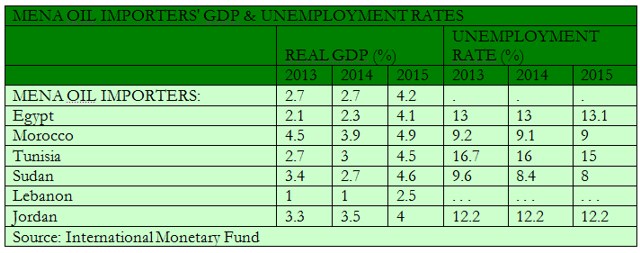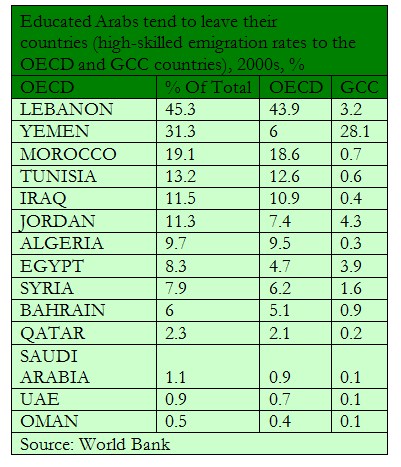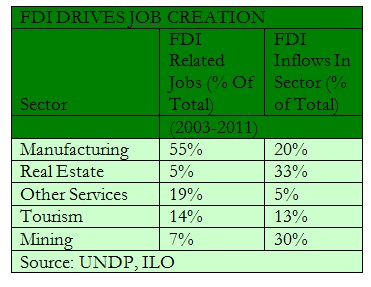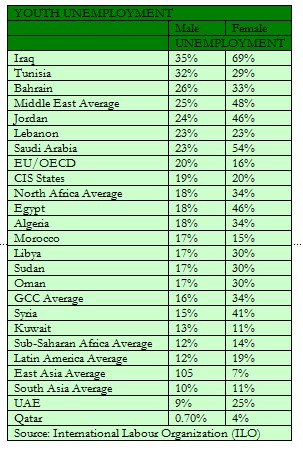Oil-importing Arab countries need to create seven million jobs through 2018 to cut soaring unemployment levels, but are unlikely to achieve that target with modest GDP growth rates, according to the International Monetary Fund (IMF).
More than three years after a popular uprising in the Arab world mostly by young people demanding social equality and jobs, the regional authorities have struggled to meet the demands of their citizens.
"Under current baseline projections for GDP growth of around 4¼% in these countries through 2018, fewer than five million jobs will be created, compared with about seven million jobs needed to reduce the unemployment rate halfway to the average of emerging markets," the IMF said in a report on distressed Arab economies such as Egypt, Jordan, Tunisia and Morocco.
The region will have to average growth rates of 6¼% to meet the seven million target, especially in Arab countries in transition (ACT), the fund estimates. [ACT includes countries that have undergone regime change, namely Egypt, Tunisia, Libya, and Yemen and countries that have transformed within existing regimes, namely Jordan and Morocco.]

FRUSTRATED YOUTH
With each passing year, unemployment is escalating at an alarming level due to a transformative change in the region's demographics.
The total population of the Arab world has grown 53% in the past couple of decades to 343 million, according to data by the International Labour Organization.
One in every four Arabs is in school - or nearly 80 million students being groomed to enter the job market within a decade. Secondary level enrolment has risen to 70% from 20% two decades ago, while youth literacy is 92% in North Africa and 99% in the Middle East.
"While large numbers of people are coming out of the education system, graduates have not necessarily had a high quality education and do not always have relevant skills that equip them to compete in the open labor market," notes the ILO in a separate report.
It said MENA firms offered the least amount of training to their employees compared to corporations in other regions.
Not surprisingly, youth unemployment in the Middle East stands at 25%, with Iraq (36%), Jordan (35%), Tunisia (32%) and Bahrain (26%) exceeding regional averages. Indeed, the region's youth unemployment is higher than the European Union (20%), CIS states (19%) and Latin America (12%).
Unlike other regions where unemployment mostly affects lower-income households, in the Arab region unemployment affects income groups more or less equally, noted a report from the U.N. Development Programme and International Labour Organization.
Not surprisingly, a very high percentage of Arab workers tend to leave their countries, and migrate to OECD countries or the GCC states.
HOW TO CREATE JOBS
Restrictive investment policies, lack of legal and business frameworks and a general hostility towards foreign investment in key sectors have hindered domestic growth and job-creation.
In many cases, governments run large sectors such as power, aviation, transport, real estate and telecommunications and actively compete with private and foreign investors.
The Arab Spring has done little to force governments to hasten reforms and instead deploy short-term policies. Regional authorities have raised public-sector wages and hired more citizens in government services, rather than creating more sustainable opportunities.
"This new current spending was partially offset by reductions in already low capital spending, and sometimes, also, by reductions in maintenance, education, and health spending--all of which are integral to sustained improvements in private sector activity," the IMF said.
Stimulus packages and wage hikes have only added to the government's burden, leaving citizens with ever greater dependence on the public sector.
"Strategic spending reorientation should aim at eliminating generalized subsidies, undertaking comprehensive civil service reforms, and channeling part of these savings toward enhancing the coverage and amounts of targeted social assistance and strengthening public investment," the IMF recommends.
Improving and simplifying the tax systems is another important way to enhance government revenues. Revenue measures should focus on broadening the tax base and improving the efficiency of tax collection. Some ACTs also have room for raising income tax progressivity and increasing excise and property tax rates, the IMF recommends.
"Together, these policies would enhance equity while freeing scarce resources for priority expenditure in infrastructure investment, health, and education."
INTRA-REGIONAL TRADE
Political instability and hostility towards neighbors have prevented deeper trade integrations.
"Intra-regional exports of non-oil goods are estimated to have been around 30% below their potential, while regional trading agreements have not contributed to a deeper international integration of Arab countries," the ILO said.
"Complementary investment and institutional policies, such as in the area of transport and customs clearance, if properly developed, could have eliminated a number of obstacles hampering smaller firms and increased intra-regional trade by up to 10%."
Most North African countries, for example, have aligned their exports to mature EU markets rather than the fast-developing economies of Sub-Saharan Africa and Asia.
Arab exports have also been inhibited in some cases by overvalued exchange rates. Although countries such as Morocco and Tunisia have streamlined and lowered their tariffs, these remain high, and there are also significant non-tariff barriers, the IMF noted.
"Deeper trade integration could provide a significant boost to the region's economies. Empirical evidence suggests that raising the MENA region's openness to the level of emerging Asian countries could increase GDP growth by as much as a full percentage point," according to the fund.
INFRASTRUCTURE
Lack of investment in infrastructure has also stunted job creation.
According to some estimates, 1% of GDP spent on infrastructure could, in the short term, generate as many as 87,000 new jobs in Egypt and 18,000 jobs in Tunisia. Better logistics in Egypt could increase its exports by 12%, according to a separate report by the IMF.
"Morocco has shown a large improvement in this respect through investment in port infrastructure (including the expansion of Tanger-Med to become the largest port in Africa) and in thinning out obstructive procedures."
CUTTING RED TAPE
Regulatory changes, improved governance and reducing red tape are other crucial fixes.
Egypt, once identified by the World Bank as a top business reformer, is now the 128th most business-friendly jurisdiction in the world. The country has catalogued 36,000 regulations affecting the private sector originating from different parts of the government.
On average, 22% of firms in the region perceive business licensing and permits as a major constraint to their activities, by far the highest share among the world's regions.
"The ACTs need a medium-term vision to set policies for their economic future...an economic model that provides a more level playing field, allows for greater integration into the global economy, and creates an environment in which a dynamic private sector can drive growth and create sufficient jobs for a growing labor force, while governments provide adequate infrastructure and regulation, along with basic services and targeted social protection," the IMF concluded.
The feature was produced by alifarabia.com exclusively for zawya.com.
© Zawya 2014




















